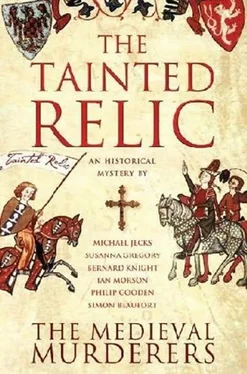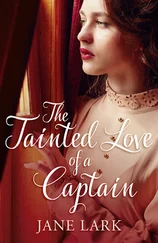On the other side, Wapping Doll had no weapon, although she held out the leathern drinking flask as if she might do damage with it. But my money was on the roasting-spit.
At that moment the women were happy enough exchanging insults and gestures. ‘Turd in your teeth’ and the Spanish fig and so on. The crowd was split between urging them on to better things and glancing round to see whether any constable from the Pie-Powder Court was about to intervene. I might have known that Abel Glaze and Jack Wilson would be among the watchers.
‘What’s this all about, lads?’ I asked.
‘What do women ever fight about?’ said Jack. ‘They are as ready to go to blows over men as we are to go to blows over women.’
‘I wish someone would fight over me,’ said Abel, who was not lucky in love.
And suddenly it came to me. Hadn’t Ulysses Hatch said to his doxy when they were bantering in the tent, Go ask at the pig stall ? Was it possible that these two were scrapping over the publisher of spicy wares?
Wapping Doll and Ursula-if it was indeed the pig woman-circled each other like two dogs, one jabbing with the roasting-spit and the other flapping her flask, but each reluctant to make the first move. The crowd kept quiet, unwilling to break the spell. But before the women could get down to fighting, a pair of constables pushed their way through the throng and, in a practised manoeuvre, placed their staffs of office on the ground. These were long heavy poles, intimidating in appearance and tough enough to break an arm or crack a skull. If they’d been dealing with men they might have employed the staffs. But, with women, they preferred a more personal touch.
They laid hands on the pair. They were big fellows with beetling brows, a regular Gog and Magog. One wrapped his arms round Ursula while the other seized hold of Wapping Doll’s flask. For an instant it looked as though the women were going to turn their fury on the constables, but I also sensed a kind of relief in the pair, as though they’d been honourably relieved of the requirement to fight it out.
Then, as a late arrival on the scene, there appeared a diminutive man with a trim beard. By chance I recognized him. He was an alderman and a justice, Walter Farnaby by name. A year or more earlier I’d witnessed him sealing up a plague house in Kentish Street. He was a precise individual, not to be gainsaid. He was evidently acting as the St Bartholomew’s Fair Justice. A number of the crowd recognized him too, to judge by their groans and whispers. At Farnaby’s gesture, the two constables released their charges. The men obeyed but they looked as though they might have enjoyed grappling with the women for a few moments longer. I don’t know what the Justice said to the two women-he went to each and spoke softly in her ear-but it was enough to cause them to turn round and go off in separate directions, Ursula back to her pig stall and Wapping Doll towards the area of the fair where I’d just come from.
There was general disappointment at the Justice’s intervention. I heard some comment about the authorities interfering with people’s innocent amusements while proper criminals roamed free about the place. Thinking of Nightingale the ballad singer and his accomplice, I couldn’t help agreeing.
Jack and Abel were curious to know what had happened with the bookseller. I stayed quiet about the relic, saying only that Ulysses Hatch claimed to be in possession of Shakespeare’s foul papers but that he’d needed time to search for them. I added that there was some old enmity between Shakespeare and Hatch and that the bookseller kept some odd company, which included, as well as the woman we’d just seen, a talking raven called Hold-fast. I also told them of my encounter with Tom Gally.
While we were waiting to return to Ulysses Hatch’s lair we occupied the period wandering round the fair, stopping to sample some ale and being propositioned by the sellers of horseflesh, human flesh and other gewgaws. As smart Londoners, however, we were resistant to pretty well every temptation.
Eventually, after we’d judged that enough time had passed, we found ourselves once more at the mouth of the bookseller’s tent in that quiet quarter of the fair. It was odd that Master Hatch should set up here out of the run of things. Maybe his customers liked to visit him discreet and unseen on account of his spicy wares. The books and pamphlets lay undisturbed on the trestle table. The flaps of the tent were open and, once again, I had the sense of being spied on through the curtain that hung across the interior. Perhaps it was the raven with his diamond eye. I’d have preferred a human gaze.
I called out for Master Hatch. No reply. Called more loudly. Half expected Hold-fast to tell me to jump to it. Or shut my gob. I glanced at the others and indicated that we should go inside. Hatch could have no objection, surely. A simple transaction, no more. Hand over the four pounds and depart with the Domitian papers. And, on a future occasion, show myself a little less ready to undertake errands on behalf of William Shakespeare.
We filed into the tent. I slipped round the curtain.
Inside, it was dim and stuffy and smelly. But the smell was different this time, burnt and bitter.
You know what we found next.
‘My God, Nick, what shall we do?’ said Abel Glaze.
‘I don’t know.’
‘We should go to the Justice,’ said Jack Wilson. ‘This is murder plain and simple.’
‘He’s been shot,’ said Abel, looking at the dark hole in the man’s upper chest and the bloody flag surrounding it. In his very young days, before he turned to confidence trickery, Abel had served time in the Netherlands campaign, and so knew more about war and wounds than I ever hoped to know.
‘With his own pistol, it must have been,’ I said. ‘He showed it me when he was showing me…something else.’
Jack and Abel looked at me. Perhaps they were wondering what the ‘something else’ was. I pointed to the murder weapon, which lay in a corner of the tent, as if the perpetrator had flung it there in panic before his exit. Or her exit. For a pistol can be discharged by a man or a woman.
‘That’s a snaphaunce,’ said Abel. ‘They were much used in the Low Countries.’
Neither of us responded to this piece of professional information.
‘We can just walk out,’ said Abel after a moment. ‘We don’t have to report this to anyone. Not a soul knows we’ve been here.’
‘ You can walk out,’ I said. ‘But I’ve been seen already in this place.’
I was remembering Wapping Doll. I also recalled the individual with the straws in his hat who’d slipped out as we arrived at the tent for the first time.
‘Then we must go to the Pie-Powder Court,’ said Jack. ‘This isn’t some case of a cutpurse and a ballad singer.’
‘Yes, you’re right, we must go to the court,’ I said, looking round. ‘Where’s the bird?’
‘Bird?’
‘Hold-fast, the raven I told you of.’
‘Blast the raven,’ said Jack. ‘We have a dead man on our hands.’
‘Wait a moment,’ I said, bending down to examine a pile of paper which I’d just noticed lodged beneath Ulysses Hatch’s bulk. I eased it from under the body. The sheets were old and crumpled and blood-smeared but a glance was sufficient to show that they were WS’s unperformed play of Domitian . It said as much on a handwritten title page. Hatch had found it after all. The last thing he did, perhaps. Well, I thought, as I tucked the creased sheets into my doublet, I’ve saved my master four whole pounds. It’s odd how these trivial thoughts come at the direst moments.
Seeing that I’d obtained what we’d come for, the others made to leave, but I lingered for an instant, curiosity overcoming fear and revulsion. I glanced inside the open trunk then rummaged among the cloth and plate. I’d been right. There was no little box, nestling among folds of cloth. No glass vial, no sacred fragment of wood.
Читать дальше












